It’s our business to make Nandri work!
In Nandri, we believe that it is very important for our Donors to understand how our charity works, how it benefits our families and where their money is being utilised. The tightly organised day to day running of our charity is key to its success. The CEO of our partner organisation in India once said to me “Fred this is not a business it’s a charity”. I answered that unless we run it like a business with professional procedures and systems then it will not prosper.
We implemented Salesforce, one of the best corporate CRM systems in the world, and a number of user licenses were made available to us free of charge by the company. We are extremely grateful to Salesforce. It has enabled us to manage the records we have on thousands of our Nandri mothers in our non profit.
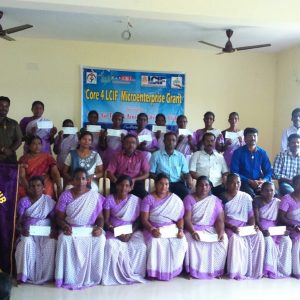 In January 2012 we started a micro finance programme to give a loan to a mother to buy a cow or other income generating asset. The mother can repay a loan within two years and all repayments are immediately re-loaned to another needy mother in the group.
In January 2012 we started a micro finance programme to give a loan to a mother to buy a cow or other income generating asset. The mother can repay a loan within two years and all repayments are immediately re-loaned to another needy mother in the group.
In 2013 we realised that many of our children were dropping out of education at 17 or 18 years of age. We then started to give them loans to go to college. This immediately doubled the number of our children who go to 3rd level, as many families could not previously afford the upfront fees, despite the fact that this was only in many cases less than €100 per annum. Most of our mothers only earn €20 a month.
We could not manage these programmes without the appropriate technology and systems and Salesforce is the most important system which we use. Today we have quite an extensive, complex database, with details of over 3,500 mothers, 2000 children and 700 current donors in our system
Every month almost Rs.2 million is processed through the Salesforce system. Within two weeks of each month end we receive a set of management accounts which have been audited by a local chartered accountant in India. In Ireland one of our directors who is also a chartered accountant produces monthly accounts for Ireland and reviews the accounts from India.
Our mother’s pay 1% per month interest on the reducing balance and this is mainly used to fund the third level loan program. Our mothers also pay a membership fee of about one rupee per day. This income is enabling us to grow the organisation and to achieve a level of self sustainability in India.
In February 2016 we opened our Nandri centre. It is a 6000 ft.² building. The opening was attended by over 3500 mothers and children and local dignitaries. It has put us on the map locally and has enabled us to apply for grants from the Indian government to run training programmes for our mothers and children. It cost about €300,000 and was fully paid for by a small number of donors from Ireland including some directors. The building is used for training courses and administration and for regular meetings of over 600 officers of our 200 mothers self-help groups.
Most of our 3500 mothers are members of the low caste so-called untouchable Dalit community. We found it difficult to rent rooms for meetings and offices. Our mothers are treated like travellers in Ireland, who find it hard to rent rooms for weddings or other celebrations. Our 3500 mothers proudly wear their Nandri saris and are proud to be part of our organisation.
We are a small organisation and our revenue for the current financial year is likely to be around €200,000. We only have one part time employee in Ireland who works 10 hours a week. Our future strategy is to grow our micro finance fund. Since 2012 we have issued loans of over €900,000. The repayments are used to issue about 50 to 100 new loans every month.
In 2016 we were approved a grant of $50,000 from the Lions Clubs International Foundation #LCIF. We had to come up with $17,000 matching funds and much of this was provided by Lions Clubs in Ireland. This fund has already being used to provide loans to 350 widows and single parents.
On top of our micro finance programmes, our mothers, who meet every month in groups of 15 to 20, are also encouraged to save. They save about Rs.100 per month which is the equivalent of a days wages for them. This money is reloaned to their group colleagues. They also charge each other a small interest-rate. Our mothers proudly show off their passbooks which record their subscriptions, savings and loans. We have set up the necessary paperwork systems to enable them to manage these loans and savings themselves. We employ eight fieldworkers who attend all the meetings to ensure that all our procedures and systems are maintained.
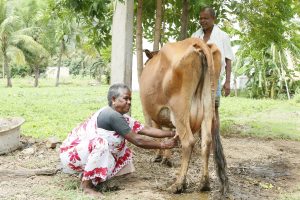 We want our sponsors and donors to know that we make their money go far. Every €400 donation will change the life of a family who receive a loan to buy a cow. Two years later the same money will benefit another family and so on. A donation to Nandri is a gift that keeps on giving. Our future plan is double the size of our loan book. Within five years we hope to have 10,000 mothers of which over 5000 will have received a life changing loan.
We want our sponsors and donors to know that we make their money go far. Every €400 donation will change the life of a family who receive a loan to buy a cow. Two years later the same money will benefit another family and so on. A donation to Nandri is a gift that keeps on giving. Our future plan is double the size of our loan book. Within five years we hope to have 10,000 mothers of which over 5000 will have received a life changing loan.
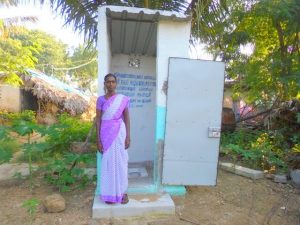 It is normal in poor areas of rural India for families to defecate in the fields beside their homes. The loans from Nandri to help build toilets has changed the lives of these impoverished people and given them the opportunity to live cleaner and therefore healthier, more dignified lives.
It is normal in poor areas of rural India for families to defecate in the fields beside their homes. The loans from Nandri to help build toilets has changed the lives of these impoverished people and given them the opportunity to live cleaner and therefore healthier, more dignified lives.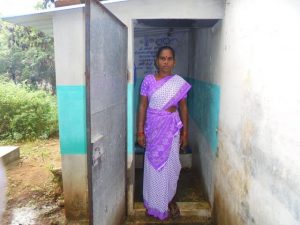 Nandri would like to say a big thank you to our supporters of this project. You are helping us transform the quality of these families lives forever.
Nandri would like to say a big thank you to our supporters of this project. You are helping us transform the quality of these families lives forever.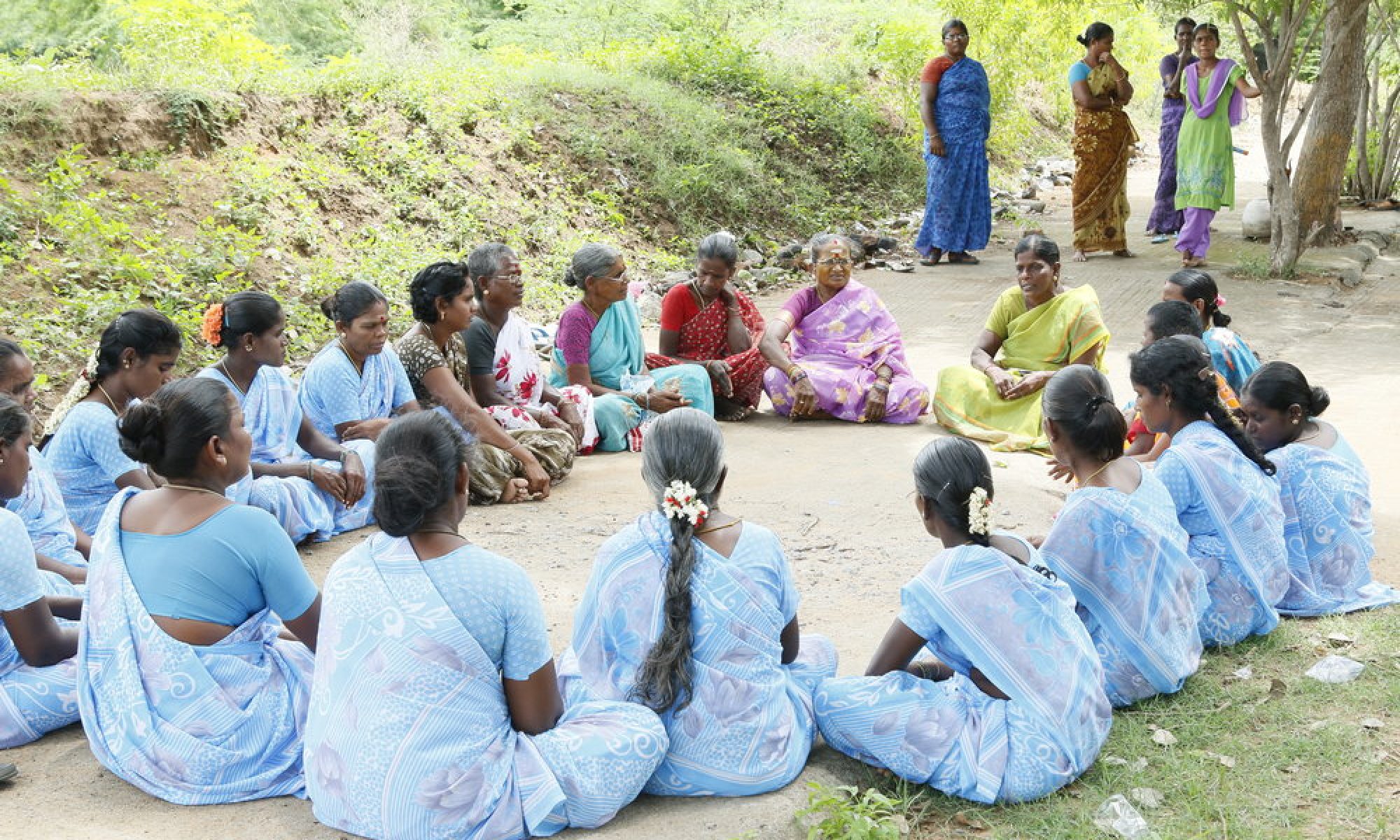
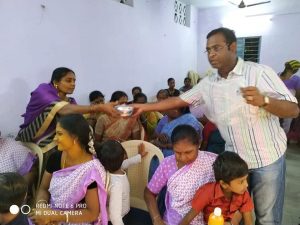 Christmas should be a season of happiness and joy but for our poor Dalit mothers, struggling to survive, this is not the case. This year, we wanted to make Christmas extra special for them. In previous years we gave our mothers sarees but this year our group leaders suggested we give small gifts to celebrate Christmas and recognise our mothers achievements in the past year.
Christmas should be a season of happiness and joy but for our poor Dalit mothers, struggling to survive, this is not the case. This year, we wanted to make Christmas extra special for them. In previous years we gave our mothers sarees but this year our group leaders suggested we give small gifts to celebrate Christmas and recognise our mothers achievements in the past year.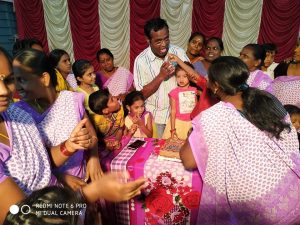 It certainly lifted their spirits! They sang and danced and were delighted with the presents they received. The spirit of Christmas and the joy of giving brought happiness to all during our celebrations.
It certainly lifted their spirits! They sang and danced and were delighted with the presents they received. The spirit of Christmas and the joy of giving brought happiness to all during our celebrations.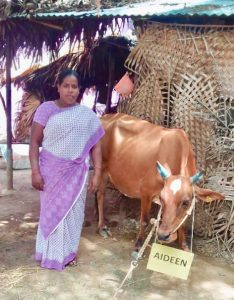 Nandri provided the mother with a micro finance loan enabling her to buy the cow which will give her family food, in the form of dairy products, an income from the products she can sell and in the future, a calf which will further boost the income of the family. Because of the increase in income, the children will be able to afford to continue their education. What a difference a cow makes in the lives of our poor families. This mother will never forget how a jar full of coins changed her life.
Nandri provided the mother with a micro finance loan enabling her to buy the cow which will give her family food, in the form of dairy products, an income from the products she can sell and in the future, a calf which will further boost the income of the family. Because of the increase in income, the children will be able to afford to continue their education. What a difference a cow makes in the lives of our poor families. This mother will never forget how a jar full of coins changed her life.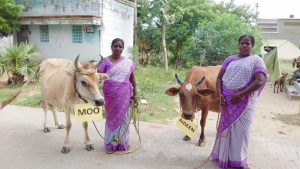
 In January 2012 we started a micro finance programme to give a loan to a mother to buy a cow or other income generating asset. The mother can repay a loan within two years and all repayments are immediately re-loaned to another needy mother in the group.
In January 2012 we started a micro finance programme to give a loan to a mother to buy a cow or other income generating asset. The mother can repay a loan within two years and all repayments are immediately re-loaned to another needy mother in the group. We want our sponsors and donors to know that we make their money go far. Every €400 donation will change the life of a family who receive a loan to buy a cow. Two years later the same money will benefit another family and so on. A donation to Nandri is a gift that keeps on giving. Our future plan is double the size of our loan book. Within five years we hope to have 10,000 mothers of which over 5000 will have received a life changing loan.
We want our sponsors and donors to know that we make their money go far. Every €400 donation will change the life of a family who receive a loan to buy a cow. Two years later the same money will benefit another family and so on. A donation to Nandri is a gift that keeps on giving. Our future plan is double the size of our loan book. Within five years we hope to have 10,000 mothers of which over 5000 will have received a life changing loan.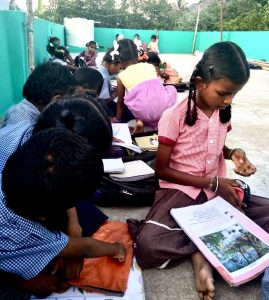
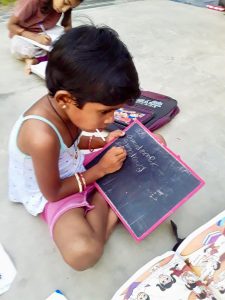
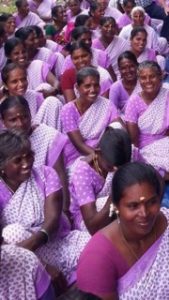 In July, 52 Nandri mothers received life changing micro finance loans which would help them start their own business or give them the finance to send their children to third level education. This programme gives a lifeline to our impoverished mothers and their families. As the mothers pay back their loans each month, these repayments enable us to lend to more than 50 new mothers the following month. The cycle of success of our micro finance loans continues to grow and flourish bringing hope and a future to new families each month. NANDRI, changing lives.
In July, 52 Nandri mothers received life changing micro finance loans which would help them start their own business or give them the finance to send their children to third level education. This programme gives a lifeline to our impoverished mothers and their families. As the mothers pay back their loans each month, these repayments enable us to lend to more than 50 new mothers the following month. The cycle of success of our micro finance loans continues to grow and flourish bringing hope and a future to new families each month. NANDRI, changing lives.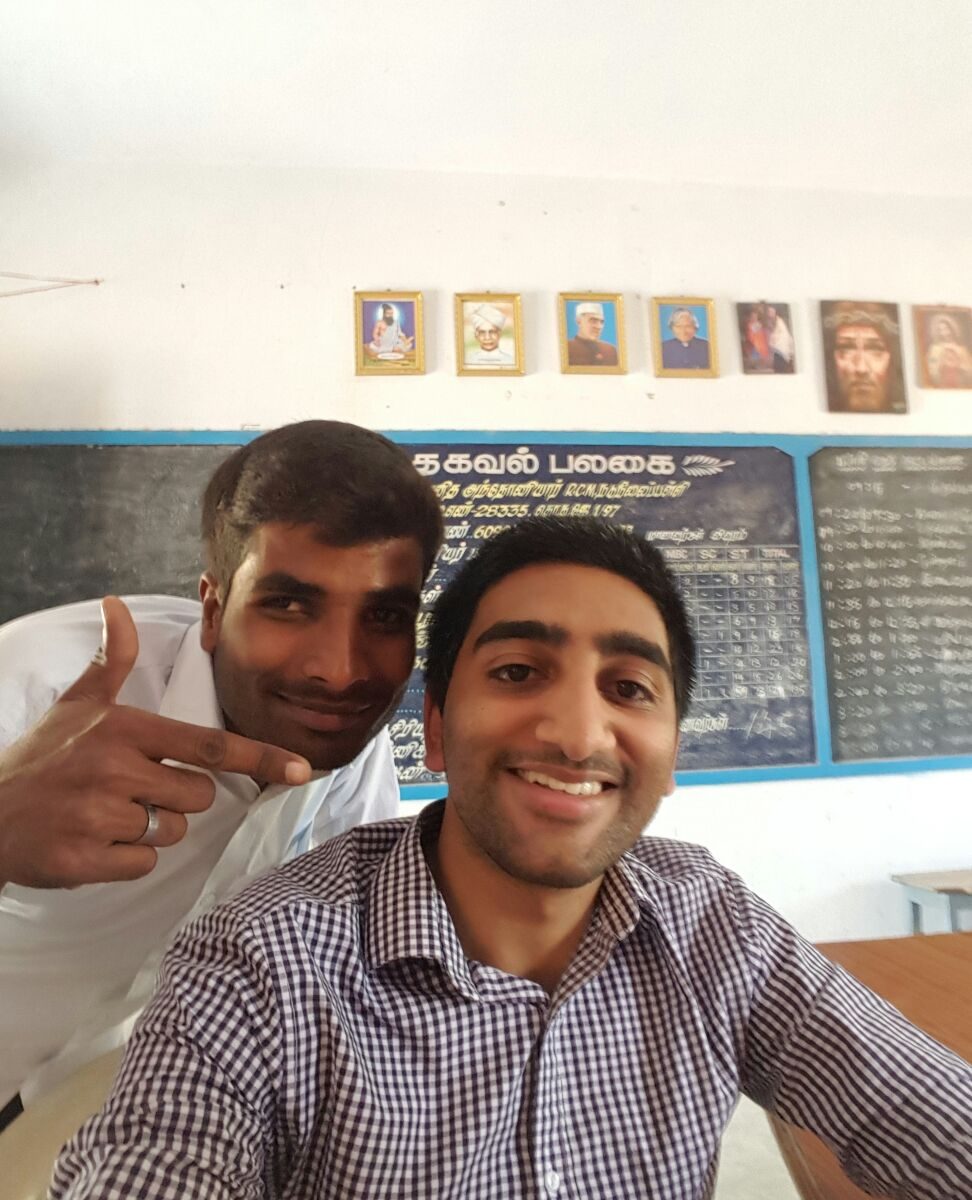
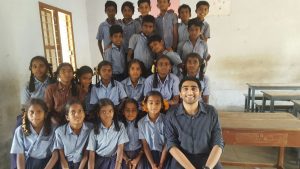 en I set off from the Nandri centre with Joe the Nandri India CEO. Being honest I didn’t really know my destination, only that it would be quite rural and unlike anything I had experienced before. After driving past many towns and some bigger villages we started to head to a more mountainous area until we finally arrived in the village of Udaiyarkuppam. To my surprise and delight there stood a St. Anthony’s church with the parish house beside it where I would be staying for the next week or so. I would be living with the parish priest, Fr Arokiya Raj, who thankfully spoke English well and helped me to adjust.
en I set off from the Nandri centre with Joe the Nandri India CEO. Being honest I didn’t really know my destination, only that it would be quite rural and unlike anything I had experienced before. After driving past many towns and some bigger villages we started to head to a more mountainous area until we finally arrived in the village of Udaiyarkuppam. To my surprise and delight there stood a St. Anthony’s church with the parish house beside it where I would be staying for the next week or so. I would be living with the parish priest, Fr Arokiya Raj, who thankfully spoke English well and helped me to adjust.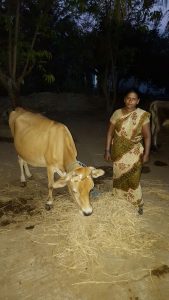 Across the yard from the church was the local school where Joe had suggested that I could help teach English while I was there. I hastily met the young principal, Karthik, and before I knew it I was officially a teacher at Anthony R.C.S Middle School. Suddenly in front of me I had 40 odd expectant kids, looking back curiously at this overawed foreigner. This was a Tamil medium school so the standard of English and exposure to it were rather poor.
Across the yard from the church was the local school where Joe had suggested that I could help teach English while I was there. I hastily met the young principal, Karthik, and before I knew it I was officially a teacher at Anthony R.C.S Middle School. Suddenly in front of me I had 40 odd expectant kids, looking back curiously at this overawed foreigner. This was a Tamil medium school so the standard of English and exposure to it were rather poor.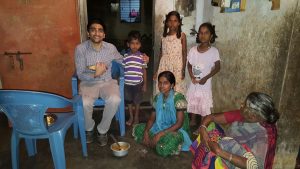 Break times were filled mostly with playing kabaddi, the local sport, where you try to tag the opposing team and run back to your team’s half before they catch and take you down. I had resisted many calls from the students to be a ‘raider’ but eventually gave in. It can get quite rough but thankfully they understood me saying “soft” before they gleefully took me down!
Break times were filled mostly with playing kabaddi, the local sport, where you try to tag the opposing team and run back to your team’s half before they catch and take you down. I had resisted many calls from the students to be a ‘raider’ but eventually gave in. It can get quite rough but thankfully they understood me saying “soft” before they gleefully took me down!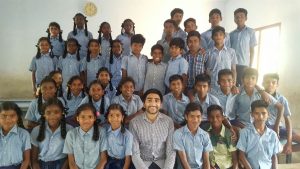 There are around 260 children, mainly Dalits, in the school and each day ends with everyone outside singing the national anthem before heading home which was quite different to Ireland. Admittedly it was daunting at first having never been in a comparable situation but I feel it was a worthwhile and beneficial experience for me and hopefully the students too!
There are around 260 children, mainly Dalits, in the school and each day ends with everyone outside singing the national anthem before heading home which was quite different to Ireland. Admittedly it was daunting at first having never been in a comparable situation but I feel it was a worthwhile and beneficial experience for me and hopefully the students too!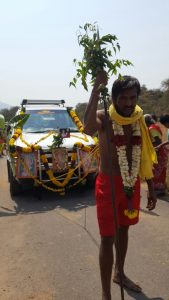 their homes. I’m grateful to their willingness to help us locate fellow group mothers on our list and inform us of any issues. I was also offered numerous snacks, fruits, tea and juice which was very welcome in the scorching heat. Indeed, I had the opportunity to have dinner in some of the mother’s houses and taste some local dishes which was nice- despite being far spicier than I’m used to! I was also able to attend a local Hindu festival one day which included inserting metal hooks into the backs of some worshippers and walking on fire followed by a procession. I had seen some similar things on t.v before but it was interesting to see it up close.
their homes. I’m grateful to their willingness to help us locate fellow group mothers on our list and inform us of any issues. I was also offered numerous snacks, fruits, tea and juice which was very welcome in the scorching heat. Indeed, I had the opportunity to have dinner in some of the mother’s houses and taste some local dishes which was nice- despite being far spicier than I’m used to! I was also able to attend a local Hindu festival one day which included inserting metal hooks into the backs of some worshippers and walking on fire followed by a procession. I had seen some similar things on t.v before but it was interesting to see it up close.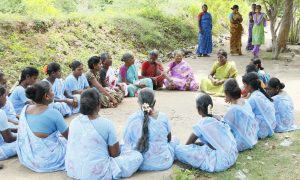 In 2012 we started our
In 2012 we started our 
 After a few hours of sleep, I awoke and put on my veshti or dhoti, the traditional garment tied around the waist worn mainly in South India, normally in white for special occasions. It was time to attend the street rally/parade organised in the nearest town with hundreds of women coming from many villages. In true Indian fashion, the rally only began when it should have finished!
After a few hours of sleep, I awoke and put on my veshti or dhoti, the traditional garment tied around the waist worn mainly in South India, normally in white for special occasions. It was time to attend the street rally/parade organised in the nearest town with hundreds of women coming from many villages. In true Indian fashion, the rally only began when it should have finished! There was also a prayer held in remembrance of the movement’s founder, Tony Barron, who passed away recently. The major events of the day were the opening of the computer and language teaching room which will undoubtedly be crucial to improving the prospects of a better life for numerous children in the area. Concurrently the solar power generation room was inaugurated with the centre now running on power generated from the newly installed solar panels which shows the commitment of Nandri to being environmentally sustainable which was pleasing to see.
There was also a prayer held in remembrance of the movement’s founder, Tony Barron, who passed away recently. The major events of the day were the opening of the computer and language teaching room which will undoubtedly be crucial to improving the prospects of a better life for numerous children in the area. Concurrently the solar power generation room was inaugurated with the centre now running on power generated from the newly installed solar panels which shows the commitment of Nandri to being environmentally sustainable which was pleasing to see.